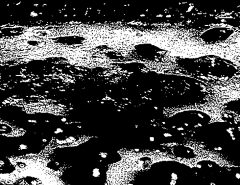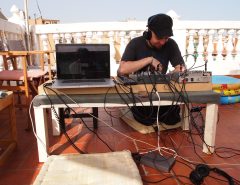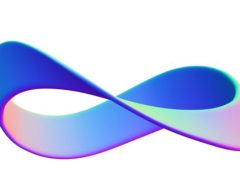The Particle v1.0 by Alex Posada vía Alex Posada y Create Digital Motion
How much sonic and eye-popping goodness can you wrap into a big, light-up sphere? So much goodness.
“The Particle” is a kinetic sculpture produced at Barcelona’s visual arts workshop Hangar by software and interactive audiovisual artist Alex Posada. Packed with custom electronics and using XBee for wireless communications, the creation responds to the space around it, transforming movement into color and sound. It’s perhaps the perfect response to advances in particle physics; just as unseen particles are, the orb is entangled with what happens around it. Rings of colored LED lights rotate in rings by a motor, and surround sound makes the audio response spatialized, as well. Skip halfway into the video and see this thing in motion – epileptic visitors may want to avoid this creation. Rapid gyrations make the life of the object mysterious, turning the fixed structure of the sculpture into a hypnotic, indeterminate phenomenon. Switched off, the sculpture is rigid and mechanical-looking, but switched on, it becomes something magically ephemeral. I’d give up my television in my house to look at this every evening; I’m strange like that.
Here’s the English translation of the description by the artist:
“The Particle» is a kinetic sculpture that experiments with color, sound and movement. A sensor monitoring system analyzes the users movements in the exhibition space. Around the space occupied by the sculpture defines a surround sound system that reacts and becomes one with the movement and light. The continuous rotation, speed and light create visual POV effects that define the spatial structure of the object. The translucent skin created from the moving light becomes visible, creating shape and volume, both inside and outside the object. How light emerges from the limited movement of each of the rings when there is a change in external conditions (visitors) or there is a random mutation. The sculpture forms and reacts by generating events that modulate the sound and space, constantly changing atmosphere and perception. Given that the regulatory mechanism of the entire design is based on the decision making haphazard manner, the new models are emerging from the previous naturally. The vibration of sound, color and visual patterns evolve into chaos or order according to evolutionary algorithms that govern it. The structures generated in this process can not be anticipated and evolve through continual iterations involving alterations to the programs and exploring the changes through interaction with the visitor and the software. The object, at the same time is a space for sensory and kinesthetic experience, a body with its own internal resonance.




Leave a Reply
Lo siento, debes estar conectado para publicar un comentario.